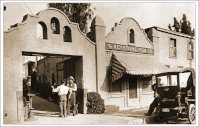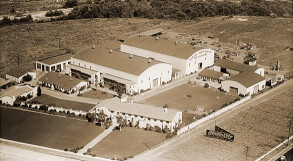Mack Sennett

Mack Sennett was born Michael Sinnott in Canada on January 7, 1880 and rose to prominence as an American film actor, director, and producer. He was known as the King of Comedy and his Keystone Studio was known as the "Fun Factory."
After a stint as an actor working for the famous director DW Griffith at the Biograph Company in New York, Sennett struck out on his own and became as famous as his prestigious mentor.
In 1912 Sennett partnered with the New York Motion Picture Company and opened the nation's largest studio (to that point) in Edendale, California, the Keystone Studio.
Sennett gave starts to many of the industry's earliest stars including Charles Chaplin, Roscoe Arbuckle, Mable Norman, Gloria Swanson, and Ben Turpin. He invented the pie-throw, the car chase, and other slap-stick routines.
In 1917 Sennett gave up the Keystone trademark and became an independent producer and renaming his lot Sennett Comedies. He expanded to both sides of Allesandro St. in Edendale and built a large enclosed stage and several open air stages. After a failed attempt at partnering with Griffith and Thomas Ince to distribute their movies, the company began to flourish again under the distributorship of Paramount.
Outgrowing his Edendale plant, Sennett built a second world class studio in Studio City in 1927 with two enormous stages to be used for the coming sound era. The studio has been in continuous operation right to this day. The studio has its own storied history and survives now as CBS Studio Center.
Sennett did not fare as well as the studio he built. The new studio proved very expensive to run. His style of comedy was out of fashion, talkies had taken over, and Sennett struggled to find a new creative voice. Even his mentor, the great DW Griffith, struggled to make movies that audiences would love and pay to see.
He also made a bad real estate investment called Hollywoodland (the Hollywood sign is all that is left of the development), and Sennett lost money in the stock market crash of 1929. Times were tough.
The struggles were not unique to Sennett. Many other companies were struggling and filing for bankruptcy. The depression was in full swing. The cost of converting to sound proved very expensive. So arrangements were being made with creditors, and employees were forced to take pay slashes.
By 1933 Sennett had been forced into bankruptcy and his studios went into receivership and were taken over by creditors. Said one long time friend: "Mack loved making movies more than he loved making money."
After a short-live attempt at a comeback with Educational Pictures, Sennett left the industry and never made another movie. The reign of the industry's longest surviving and most prolific independent producer was at an end.
He died on November 6, 1960.


